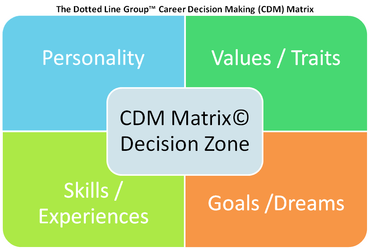The Career Decision Making (CDM) Matrix©
Harnessing your strengths, understanding your weaknesses

Focusing on weaknesses too often will not encourage you to work on those weaker points and it may also discourage you from making any decisions related to your career, as a whole. Negativity generally makes us defensive and for many, it's natural to deny negative observations or accept their own weaknesses with love, just like we love to embrace our skills or our strengths. We tend to dismiss them as irrelevant, by telling ourselves that these aspects of our personality or work are not so important. But embracing our weaknesses and acknowledging
them and working to fix them may just be one of the most important keys to our ability to find the right career path. For example, what is the point to pursue a desk job at a call center if your biggest weakness is that you cannot stay indoors for more than two hours? Ignoring such a weakness may result in getting the job at the bank but showing to work every day very frustrated or even leaving it after a short while to find a new one. This is one of the most common reasons for an ongoing career de-focus displayed by many. Can you recognize your weaknesses and have a plan to handle them?
On the other hand, most of us like to be praised and we seek compliments and reinforcements. Positive reinforcement is a key to motivate people but also a key to self motivation. Just like we have to understand our weaknesses, study them and handle them, we must recognize skills, successes and things we do best and harness them to support our career or our job search.
If you have been an expert in communication all your life, you should recognize your success and combine this understanding in your career management strategy. If you have always been a top performing sales person while on the phone, it can be that outside sales is not your ideal choice. Are you clear about what your strengths are?
Strengths and weaknesses are just two elements in our big career decision making matrix. But is there really “a dream job” for you? The answer is most likely yes, even if the word dream is unclear in this context. The reality is that most people spend a lot of time and money searching for a job instead of searching for the job most suitable for them.
We created the CDM Matrix© attempting to organize the hundreds of moving elements involved in career planning into a logical decision making framework that helps us produce an educated career decision.
See more information and examples - the CDM Matrix
them and working to fix them may just be one of the most important keys to our ability to find the right career path. For example, what is the point to pursue a desk job at a call center if your biggest weakness is that you cannot stay indoors for more than two hours? Ignoring such a weakness may result in getting the job at the bank but showing to work every day very frustrated or even leaving it after a short while to find a new one. This is one of the most common reasons for an ongoing career de-focus displayed by many. Can you recognize your weaknesses and have a plan to handle them?
On the other hand, most of us like to be praised and we seek compliments and reinforcements. Positive reinforcement is a key to motivate people but also a key to self motivation. Just like we have to understand our weaknesses, study them and handle them, we must recognize skills, successes and things we do best and harness them to support our career or our job search.
If you have been an expert in communication all your life, you should recognize your success and combine this understanding in your career management strategy. If you have always been a top performing sales person while on the phone, it can be that outside sales is not your ideal choice. Are you clear about what your strengths are?
Strengths and weaknesses are just two elements in our big career decision making matrix. But is there really “a dream job” for you? The answer is most likely yes, even if the word dream is unclear in this context. The reality is that most people spend a lot of time and money searching for a job instead of searching for the job most suitable for them.
We created the CDM Matrix© attempting to organize the hundreds of moving elements involved in career planning into a logical decision making framework that helps us produce an educated career decision.
See more information and examples - the CDM Matrix

